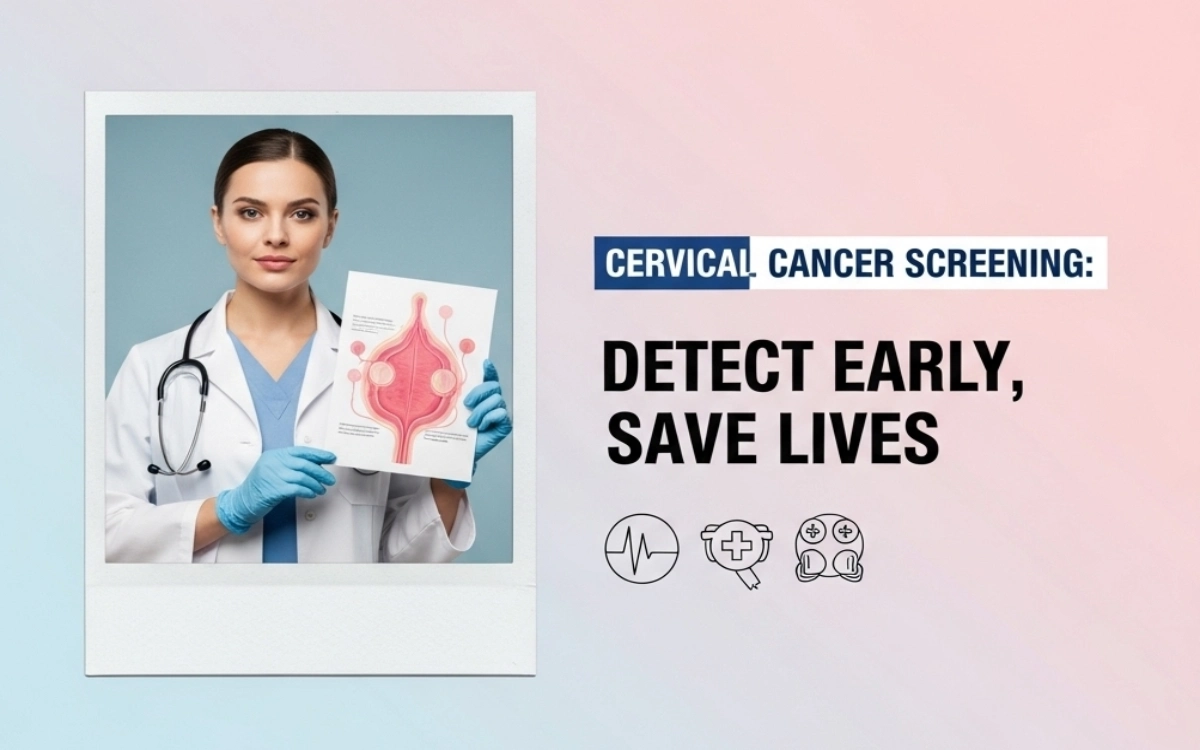Cervical cancer is one of the few cancers that can often be prevented. The most powerful way to protect yourself is by detecting changes in the cervix before they become cancer. This is possible through regular cervical cancer screening.
Screening can identify abnormal cells early, when they are easier to treat. The two main tests used are the Pap smear test and the HPV test. These tests are simple, quick, and can be done during a routine visit to your gynaecologist. They can find early warning signs even before you notice any symptoms.
By making screening part of your regular health care, you take an important step in cervical cancer prevention. In this guide, we will explain why screening matters, how the Pap smear test and HPV test work, when you should have them, and where to get a Pap smear in Dubai from trusted specialists.
Why Cervical Cancer Screening Matters in Dubai
In Dubai, women have access to excellent hospitals, modern equipment, and highly trained doctors. This makes it easy to get high-quality screening. Yet, many women delay these tests. Busy work schedules, family responsibilities, or uncertainty about the procedure often lead to putting it off.
Cervical cancer usually develops slowly over several years. In its early stages, it rarely causes any symptoms. Without regular screening, it may only be discovered once it has progressed, making treatment more complicated. The Pap smear and HPV test can find cell changes long before they become cancer, giving you more treatment options and a higher chance of a complete recovery.
For women in Dubai, especially those balancing demanding work and family life, making time for cervical cancer screening is one of the best ways to stay healthy. With advanced clinics and easy appointment access, it is possible to include this in your routine care.
Understanding Cervical Cancer and Risk Factors
Cervical cancer starts in the cells of the cervix, which is the lower part of the uterus that connects to the vagina. Most cases are linked to a persistent infection with certain types of the human papillomavirus, or HPV. HPV is very common and is usually passed through sexual contact.
In many cases, the immune system clears HPV naturally. But if the infection does not go away, it can cause cell changes in the cervix. Over time, these changes can lead to cancer.
Some factors increase the risk of developing cervical cancer. These include becoming sexually active at a young age, having multiple sexual partners, having a weakened immune system, smoking, or having a history of other sexually transmitted infections. Women who have not received the HPV vaccine are also at a higher risk.
Knowing your risk factors helps your doctor create a screening plan that is right for you.
Symptoms and Why Early Detection is Key
One of the main challenges with cervical cancer is that it usually does not cause symptoms in its early stages. This is why regular cervical cancer screening is so important. When symptoms do appear, they may include unusual vaginal bleeding, bleeding after intercourse, abnormal discharge, pelvic pain, or discomfort during intimacy.
By the time these symptoms appear, the disease may be more advanced. Screening helps catch abnormal changes long before they cause symptoms, which makes treatment easier and more effective.
The main cause of cervical cancer is infection with high-risk HPV types. Both the Pap smear and HPV test are designed to detect these early warning signs, giving you a better chance at preventing cancer altogether.
The Pap Smear Test
The Pap smear test is a quick and simple procedure. During the test, your doctor gently collects cells from your cervix using a small brush or spatula. These cells are then examined in a laboratory to look for any changes.
The test usually takes only a few minutes and may cause mild discomfort, but it is not painful for most women. The Pap smear can detect abnormal cells before they turn into cancer, which means they can be treated early.
The HPV Test
The HPV test checks for the presence of high-risk HPV strains that can lead to cervical cancer. It can be done at the same time as your Pap smear or separately. This test is especially useful for women over 30, as HPV infections in this age group are more likely to persist and cause cell changes.
If the HPV test is positive, your doctor may recommend closer follow-up or further tests to make sure your cervix is healthy.
How Often Should You Be Screened?
For most women, the recommended schedule is:
- From age 21 to 29: a Pap smear every three years.
- From age 30 to 65: a Pap smear and HPV test together every five years, or a Pap smear alone every three years.
Your doctor may recommend more frequent screening if you have certain risk factors, such as a weakened immune system, a history of abnormal results, or other health concerns.
Even if you have received the HPV vaccine, you still need regular screening, as the vaccine does not protect against all high-risk HPV types.
How Screening Helps Prevention
Regular cervical cancer screening plays a major role in prevention. Detecting abnormal cells or an HPV infection early allows for treatment before they turn into cancer. This means fewer women need invasive surgery or treatments, and more women can live healthy, cancer-free lives.
Screening also gives peace of mind. Knowing your cervix is healthy helps you focus on other aspects of your well-being and encourages a proactive approach to health care.
Common Concerns About Screening
Some women feel nervous about the Pap smear or HPV test, but the procedures are quick and straightforward. Your doctor will explain each step and ensure you are comfortable.
It is also natural to worry about the results. An abnormal result does not mean you have cancer. It may simply mean that you need closer monitoring or a small treatment to remove abnormal cells before they cause harm.
Where to Get a Pap Smear in Dubai
Dubai has many clinics and hospitals offering Pap smears and HPV tests. At Prime Hospital, Dr. Neha Lalla provides comprehensive women’s health services, including both tests and personalised cervical cancer prevention plans. Her approach combines medical expertise with a warm, supportive environment, helping women feel comfortable during their appointments.
If you are looking for where to get a Pap smear in Dubai, choosing a trusted specialist ensures your screening is thorough, accurate, and tailored to your needs.
FAQs
When should I start cervical cancer screening?
Most women should begin Pap smear screening at age 21.
Do I still need screening if I have had the HPV vaccine?
Yes. The vaccine does not protect against all cancer-causing HPV strains.
Is the Pap smear painful?
For most women, it is not painful. You may feel slight pressure or mild discomfort, but it lasts only a few minutes.
Can screening detect all types of cervical cancer?
While it is highly effective, no screening test is perfect. Regular tests combined with follow-up care provide the best protection.
A Word from Dr. Neha Lalla
Cervical cancer screening is one of the most powerful tools we have for protecting women’s health. The Pap smear test and HPV test can find changes in the cervix early, often before symptoms begin, making treatment far more effective. My advice to every woman is to make screening a regular part of her health routine. Taking a few minutes for this test can save your life.
Conclusion
Cervical cancer is often preventable, and early detection through regular screening is the key. The Pap smear test, HPV test, and a consistent screening schedule give women the best chance of preventing the disease.
If it has been more than three years since your last Pap smear, or you have never been tested, now is the time to take action. Book your appointment with Dr. Neha Lalla at Prime Hospital, Dubai, for comprehensive screening and expert care. Early detection truly can save lives, and your health is worth protecting.


